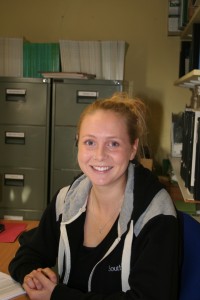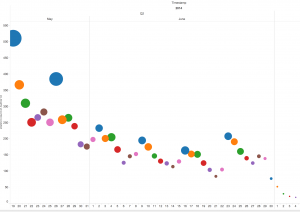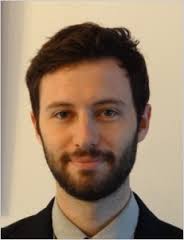Socioeconomic correlates of the planet’s key ecosystem services
July 22, 2015
by Sophie Watts
Part of the EPSRC Vacation Bursaries Scheme 2015
Student name: Sophie Watts
Student degree course: BSc Biology
Year of study: 3
Supervisor: Dr Simon Willcock, Dr Kelvin Peh and Dr Marije Schaafsma
Vacation Bursary Research project title: Socioeconomic correlates of the planet’s key ecosystem services
 Tell us a bit about you and your chosen research field:
Tell us a bit about you and your chosen research field:
I have studied two years of Biology at Southampton and have completed placement with the Game and Wildlife Conservation Trust (GWCT) using Geographic Information Systems (GIS) and carrying out wildlife conservation fieldwork. My main passion lies within the conservation and environment branches of Biology, and this internship will involve a level of data handling and analysis above and beyond anything I have done before, while still being relevant to my personal interests.
Tell us about your specific research project: The overall research project is linked with four on-going projects (ARIES, ASSETS, TESSA and WISER) that aims to investigate the links between health, development and ecosystem services on a global scale. In order to achieve these aims there are three subprojects that I am working on:
- Ecosystem Services and Development
- Ecosystem Services and Health
- Socioeconomic correlates of non-timber forest product utilisation
Within each subproject there is an element of data handling followed by analysis using software such as ArcGIS, Microsoft Access and R, the latter two I have not used before and I am keen to develop these as skills. Within this project there is an opportunity for me to assist in report writing which would improve my scientific writing and be useful for future research reports including but not limited to my third year dissertation.
Describe any future plans regarding on-going study/postgraduate research connected to your Vacation Bursary project:
This project has highlighted to me the importance of effective data management systems and in the next academic year I will study the Electronics and Computer Science (ECS) module COMP1204: Data Management to improve my skills in this area. It has always been my intention to continue to postgraduate study and this project has increased not only the appeal but also the likelihood of succeeding in a competitive research environment.
An Ambient Display for Non-domestic Energy Consumption
July 20, 2015
by Edward Cater
Part of the EPSRC Vacation Bursaries Scheme 2015
Student name: Edward Cater
Student degree course: Computer Science
Year of study: 2nd
Supervisor: Enrico Costanza
Vacation Bursary Research project title:
Tell us a bit about you and your chosen research field:
Having recently completed my second year of Computer Science at Southampton, I am currently undertaking a ten-week internship with the University’s Agents, Interaction & Complexity (AIC) research group. I will be working primarily with the HCI-focused members of the research group, designing interactive systems based around reducing energy consumption.
Tell us about your specific research project:
My project focuses on helping building inhabitants become aware of the impact of intervening with the building’s heating system (by manually adjusting the thermostat). To accomplish this, I am developing an ambient, always-on display, suitable for deployment in non-domestic buildings such as libraries. For this reason, I will be developing a web-application for use with a tablet embedded in the environment.
The display will update regularly. Some of the display’s features may include:
- Current temperature.
- Today’s highest and lowest temperatures reached
- Current expected cost of heating
- Predicted cost of heating if the temperature were to be raised/lowered by 1°C.
- Some way for the user to interact with the system. Possibly by giving emotional feedback.
Of course these are just examples. It is entirely possible that features will be removed or added as I iterate the display’s design.
The display is being developed using Django; a Python web framework.
Describe any future plans regarding on-going study/postgraduate research connected to your Vacation Bursary project:
I’m thoroughly enjoying my time here and I am now seriously considering post-graduate study at Southampton, perhaps in HCI or possibly even a field I’m yet to experience, such as Machine Learning or Computer Vision.
Before starting the project, web development was completely alien to me and I had minimal experience with Python. This internship has been an opportunity to dedicate myself completely to something new, and I have learned a lot in a very short amount of time. The post-graduates in the labs have been immensely helpful, and I have been exposed to real-world research for the first time. I look forward to working more closely with some of the researchers in the future.
Give a man a fish and you feed him for a day; teach a man to fish and you feed him for a lifetime
July 20, 2015
by Jonathan Sandman
Part of the EPSRC Vacation Bursaries Scheme 2015
Student name: Jonathan Sandman
Student degree course: MEng Acoustical Engineering
Year of study: 3
Supervisor: David Simpson
“Give a man a fish and you feed him for a day; teach a man to fish and you feed him for a lifetime.”
It might seem odd to attribute such a quote to an engineering degree, but bear with me; it actually makes an awful lot of sense.
One of the things that I have found so rewarding about studying engineering is the wide range of problems to which it may be applied; over the past 3 years of my course (still 1 more to go!) I have found myself involved in projects ranging from bridge design to auditorium acoustics, from building a loudspeaker to assessing beat detection algorithms.
In many degrees, having such a broad subject area might weaken it’s value: not in engineering. It might seem that I have been culling opportunities with decisions as far back as GCSEs. On the contrary, the opportunities that I have seem greater than ever.
An area of engineering that I am interested in, but have never had the chance to explore, is biomedical signal processing; that is, the analysis of measurements using signal processing techniques in order to advise clinical decisions. My individual project involved a lot of signal processing, which is thoroughly enjoyed, and I feel that the next step for me is to now apply these skills to something more involved in human response.
Although I am going to be involved in a few different projects throughout my research placement in slightly different areas, I am currently familiarising myself with and editing cerebral blood flow measurements for the purpose of using it to assess the cerebral pressure autoregulation function in humans. I am also planning on taking part in future tests and liaising with MSc Audiology students in order to better understand the physical meaning of the data that I am working with, and how we might use it to investigate cerebral pressure autoregulation or develop better methods of measurement
I am hoping that my research placement will introduce me to, and develop my knowledge of biomedical signal processing ahead of the module that I am taking next year. It has also opened my eyes to the myriad of opportunities that are available in research, and although I do not consider myself a candidate for a PhD, I discovered during my individual project that I find research both rewarding and enjoyable, and would like to continue to explore this further.
Adaptive Sockets for Lower Limb Prosthetics
July 17, 2015
by Luke Stoneman
Part of the EPSRC Vacation Bursaries Scheme 2015
Student name: Luke Stoneman
Student degree course: Mechanical Engineering
Year of study: 4th Year
Supervisor: Dr Liudi Jiang
My chosen engineering theme is Advanced Materials, giving me versatility in terms of skills of numerous engineering disciplines and project choices. I feel I have an affinity to studying fundamental materials and manufacture methods, such that the Advanced Materials theme has been an enjoyable one. Projects I have pursued include my extra-curricular work with autonomous robotic systems, as well as my Individual project based on analysis of high performance protective coatings for the aerospace industry.
Tell us about your specific research project:
This specific project further expands my knowledge of the potential applications of material properties. In lower limb prosthetics, the greatest challenge lies at the interface between residual limb (stump) and artificial socket. A prosthetic socket is an integral part of any prosthesis and provides an essential function in tightly joining the stump to the prosthesis. Ill-fitted sockets could cause daily discomfort, reduced prosthesis usage and soft tissue injuries in the form of stump ulcers. My project focuses on material development with a view to ultimately improving comfort and stump health for lower limb amputees.
Describe any future plans regarding on-going study/postgraduate research connected to your Vacation Bursary project:
From this research, I hope to benefit from the project skills used throughout. These include conducting comprehensive literature reviews, designing relevant experimentation methods, and materials characterization within a short time scale. Practising such processes will be a strong asset leading into my 4th year Group Design Project and Advanced Materials modules. This project also allows me to apply my advanced materials knowledge thus far to prosthetic research areas, which could help improve quality of lives of amputees. Therefore, providing successful research outcomes from this project will be personally very rewarding. I foresee myself with continued interest beyond the Vacation Bursary scheme, such that I may find myself affiliated with similar future research within the university.
Skyrmion-based data storage
June 30, 2015
by Alexander Marjoram
Part of the EPSRC Vacation Bursaries Scheme 2015
Student name: Xander Marjoram
Student degree course: Aeronautics & Astronautics/Spacecraft Engineering
Year of study: 3
Supervisor: Hans Fangohr
I’m a third- (going on fourth-) year undergraduate studying Aerospace Engineering, and some of the modules that I’ve studied over the last few years have been very enjoyable. I noticed that these modules all had something in common: they had strong computational themes, such as FEEG1001 Design and Computing, where we were given a thorough introduction to Python (this is also how I met my supervisor – Hans Fangohr – whose lectures I thoroughly enjoyed); FEEG2001 Systems Design and Computing, where I chose the UAV design, built and test project and was responsible for the programming of the on-board arduino flight computer in C++.
These experiences led me to choose a computation-based third-year Individual Project. The project involved magnetic skyrmions, simulations and plenty of coding. I definitely enjoyed it and by the time it finished I felt like I was only just getting started. My 10 week Vacation Research Project, based at the new Boldrewood Innovation Campus is a continuation of this project.
Tell us about your specific research project: Skyrmions are magnetic topological features found in nano-films and bulks of certain materials. This research project will continue my previous studies into determining the potential of skyrmions for use in energy-efficient, high-density data storage devices
Describe any future plans regarding on-going study/postgraduate research connected to your Vacation Bursary project:
I never really thought of myself as a person who would become a PhD candidate, as I could never think of a topic I’d be willing enough to research. However, this project has been both enjoyable and rewarding and I could certainly see myself continuing it in future. To what extend? I’m not sure. Fortunately I will have the whole of fourth-year to decide, and I’m hoping the module FEEG6002 (Advanced Computational Methods 1) which I am taking next year will provide further background to any future studies.
Happy First Birthday WSI :-)
June 11, 2015
by Lisa Harris via WSI
WSI celebrated its first anniversary at a special event at London’s Digital Catapult Centre on Monday. Happy first anniversary to @sotonWSI! Celebrating today @DigiCatapult looking at the era of #bigdata analytics http://t.co/4lyQJWxT1b — Uni of Southampton (@unisouthampton) June 8, 2015 The Digichamps were there providing social media support as detailed in Tim’s review. They also experimented with Periscope: LIVE on …
Gill Rider gives talk on gender equality at Westminster
June 10, 2015
by Carolin Bothe-Tews via Work Thought Blog

Reblog from isoton.wordpress.com A policy briefing on gender equality at work takes place in London this week at which the University Chair of Council, Dr Gill Rider will speak on a panel with others including Baroness Margaret Prosser (Member of the House of Lords), Ceri Goddard (Fawcett Society), Scarlett Harris (TUC) and Lena Levy (CBI). The briefing will take […]
MOOC Data Visualisation Hackthon
June 5, 2015
by Tim O'Riordan via WSI

Exploring and presenting our research data in a readily understandable visual form is an important aspect of communicating our work. Last week at our inaugural MOOC Data Visualisation Hackthon, members of the Web Observatory team and the Web and Internet Science research group at the University of Southampton get together to share and develop d3 skills, explore new datasets, and make meaningful …
The era of “big data analytics”
June 3, 2015
by Reuben Binns via WSI

While it may sound like a buzzphrase, there’s no denying that we are well and truly in the era of big data analytics. An ever-increasing portion of our daily lives, business and social relations are mediated by digital platforms and computational processes. The implications of these changes are both dramatic and subtle, and we are still only beginning to understand …
Microsoft and British Council Deep Learning Event, Kuala Lumpur
May 8, 2015
by Lisa Harris via WSI | WSI
I’m on my way to Kuala Lumpur to talk about MOOCs and Curriculum Innovation at an event organised by Microsoft and the British Council. I’ll update this post with more information, photos etc when I arrive. In the meantime, here are the slides: 1. For the panel discussion (Monday 11th May) Integrating deep learning skills into the curriculum from Lisa …
